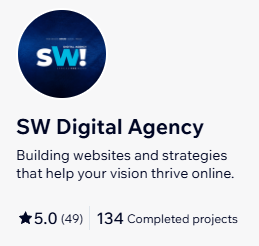Why Every Small Business Needs a Website
- Lucas Santana

- Jun 9, 2025
- 3 min read
In today's digital age, a website is not just a luxury; it's a necessity for small businesses. Whether you're a local florist or a home-based graphic designer, a well-designed website can make all the difference in how your business reaches potential customers. This post will explore the critical reasons why every small business should have its own website.
Importance of Small Business Websites
Firstly, let's discuss the fundamental role that websites play for small businesses. A website acts as a digital storefront, showcasing products and services to a global audience. According to a survey by the Small Business Administration (SBA), small businesses with websites earn 40% more revenue than those without. This statistic emphasizes the need for an online platform to attract customers.

Having a website allows you to present your brand identity clearly and concisely. You can provide information about your business, your mission, and what sets you apart from competitors. This transparency builds trust, and that trust is essential in attracting and retaining customers.
Enhancing Visibility and Reach
A crucial advantage of small business websites is their ability to enhance visibility and reach. When potential customers search online for products or services you offer, having a website ensures you appear in search results.
Statistics indicate that 75% of users never scroll past the first page of search results. By optimizing your website for search engines, you improve your chances of being seen and engaged by potential customers.

Creating high-quality content and utilizing search engine optimization (SEO) techniques can help propel your small business website to the top of search results. Content creation could be blogs, articles, or even videos that resonate with your target audience. This not only drives traffic to your site but also establishes your business as a knowledgeable player in your industry.
Building Credibility and Trust
In the digital world, credibility is key. A well-designed website instills confidence in your potential customers. If a business does not have a website, many consumers might question its legitimacy.
Having a professional-looking website demonstrates that you take your business seriously. Moreover, you can prompt past customers to leave glowing testimonials, showing prospects that you are reputable and trustworthy.

Remember that first impressions count. Your website should be user-friendly, mobile-compatible, and visually appealing. These factors contribute to a positive user experience, making visitors more likely to choose your business over others.
Cost-Effective Marketing Tool
A website serves as one of the most cost-effective marketing tools available. Instead of spending money on traditional advertising methods, such as print ads or billboards, a website allows you to reach a broader audience at a lower cost.
Through digital marketing strategies, such as email marketing, social media, and pay-per-click advertising, you can draw traffic to your site without breaking the bank. These tactics also allow for precise targeting, meaning you can reach potential customers more effectively.
Additionally, you can track and analyze data from your website, gaining insights into customer behavior and preferences. With tools like Google Analytics, you can see which marketing strategies work best for your business, refining your approach for maximum effectiveness.
Acting as a 24/7 Sales Channel
One of the most significant advantages of having a website is that it acts as a 24/7 sales channel. Unlike traditional brick-and-mortar stores that have specific operating hours, a website allows potential customers to browse your products or services at any time.
This accessibility can lead to increased sales. Consumers often conduct research or make purchases after standard business hours. By having an online presence, you cater to their needs and increase your chances of making sales at all hours.

Moreover, you can integrate e-commerce features directly into your website. Small businesses can sell products online easily through features like payment gateways and shopping carts. This convenience can drive additional revenue and reach customers who prefer online shopping.
Conclusion: Building Your Business Online Presence
In conclusion, having a website is integral for all small businesses. It not only enhances visibility and reach but also builds credibility, serves as a cost-effective marketing tool, and provides a platform for 24/7 sales. By investing in a quality website, you are setting your small business up for success in today's digital landscape.
If you're looking to establish or enhance your business online presence, start by considering the key features that align with your business goals. Make it easy for potential customers to find and engage with you, and watch your small business thrive.





Comments